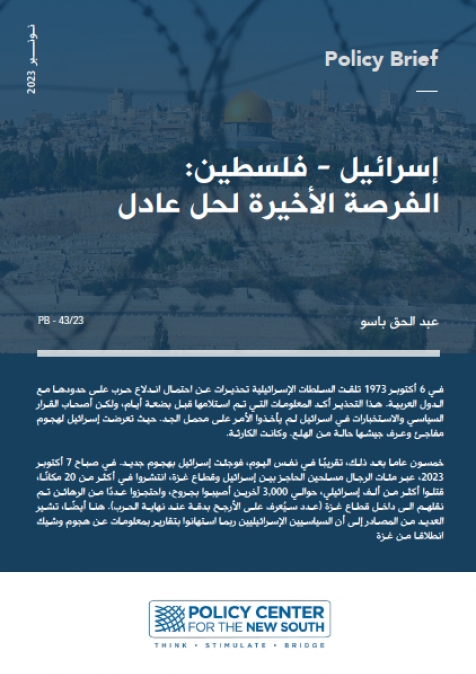Publications /
Opinion
“Russia vows to shoot down any and all missiles fired at Syria. Get ready Russia, because they will be coming, nice and new and smart” (Donald Trump on Twitter).
A menace in 223 characters - an imaginary video game moving slowly towards the reality of Hiroshima. History on collision course with our future. No thought about victims, no word of destruction, just “you should not be partner with a gas killing animal, who kills his people and enjoys it.” The Commander in Chief of the United States Armed Forces, who avoided military service in Vietnam through a medical deferment (bad feet), gave the order to fire, and 105 missiles hit, within two minutes, three empty buildings in Syria’s capital of Damascus, the Berzeh research and development center, Him Shinsar, a chemical weapons storage facility, and a nearby bunker complex. Bravo. No casualties, no dead Iranians nor Russians either. “Mission accomplished,” the President informed his nation, no accidental deviation of just one missile hitting, by accident (a computer malfunction for example), a Russian warship and drowning 1,000 sailors. Would such an incident escalate into a third world war? Why such a risk? To punish Assad for death through chemical weapons of 40 innocent citizens? Killed by chlorine munition or the nerve agent Sarin? What about 500,000 war dead (and a couple dozens more chemical weapon attacks) in the seven year conflict?
The missile attack was video and opera at the same time, the dark spirit of Richard Wagner’s music, Blitz und Donner, lighting and thunder, replacing political dialogue, one-to-one. After the strike, the Pentagon admitted Syria could gas again. The missiles created more noise in the media than on the battlefield. The Middle East has turned into a stage, replacing London’s Covent Garden opera or the Scala in Milano. Cacophony in C-dur, Trump’s manful chest thumping included, intended to demonstrate that he is the loudest, toughest tenor on the global block-- ”Mission accomplished.”
Faysal Itani, senior fellow at the Atlantic Council’s Rafik Hariri center for the Middle East, stated that ”when it comes to Syria, Washington is incoherent and ultimately disinterested. Mr. Assad knows this. He also knows as long as there isn’t prolonged and focused military action, his regime can survive”.
In Moscow, Mr. Putin continues to protect the dictator. Another missile attack, the Russian threatens, would “inevitably lead to chaos in international relations.” The allies, Britain, US and France, needed a few days to fire their missiles, an act of war, for which Trump did not ask the US congress’ permission, nor did the avengers request an approval from the UN Security Council. We do not witness “Realpolitik,” but what German philosopher Theodor Adorno (in relation to aesthetic principles) qualified as “illusion of the absolute reality of the unreal.” The unorthodox Donald Trump, apparently, is barricaded in his own unreal world, declaring lies as the truth and facts as fake news, just as George Orwell’s explanation of the philosophy of the one-party state in the chapter "War is Peace, Freedom is Slavery, Ignorance is Strength,” of his novel 1984.
For years, the American public was gripped by apathy concerning the war in Syria, which did, chemical weapon attacks excepted, not touch national emotions. Hollywood’s “High noon,” in the desert? White backed vultures replacing noble falcons? Who cares in Kentucky, Nebraska or Nevada? “America first.” The decision by Trump to declare Jerusalem the capital of Israel focused attention, briefly, towards the Middle East. Just 2000 GIs in action, fighting, assisted by brave Kurds, against Islamic State, were mentioned in the media, including US Air Force action, which counted 11,000 airstrikes since 2014.
Trump, though, was not really preoccupied by the civil war in Yemen neither. At the end of March, at an election campaign-style rally in Richfield, Ohio, Trump declared, “We are knocking the hell out of ISIS” and very soon “we’re coming out of Syria.” The White House announced, “The military mission to eradicate ISIS in Syria is coming to a rapid end. The US remains committed to eliminating small ISIS presence, but other expert countries in the region and beyond, plus the United Nations,” should now take over and make certain “that ISIS never reemerges.” A dangerous announcement since US adversaries, looking for any sign of American weakness and lack of resolve, may increasingly be convinced “that Trump is a paper tiger or maybe a twitter tiger may be more apt,” as warned Mark Dubowitz, CEO of the conservative think tank Foundation for Defense of Democracies.
Assalamu alaykum. Goodbye leaders of the Middle East. Take care of your own problems. From now on we’ll just deliver arms, threaten Moscow, Beijing and Tehran. Keep all Syrian refugees out of the US, tax German car imports and confiscate the savings of the oligarchs, who enjoy vodka with Vladimir Putin.
The United States policy options, “ever bad,” judged Susan E. Rice, national security advisor from 2013 to 2017, “are more limited and less effectual than ever.” Syria has been shattered into a series of overlapping conflicts among a kaleidoscope of combatants, global and regional powers seeking to advance their interest. The Middle East, no exaggeration, presents itself as Richard Wagner has composed and staged his “Ring” production composed of four operas with a length of 16 and a half total hours of thundering, dark, dynamic and loud music. A confusing scenario, covered by drums, trumpets, voices, and ever louder voices. If you manage to understand the Wagnerian plots, the rivalry, the fascination with gold, so much gold on the bed of the river Rhine, if you understand the moods of Wotan, or the spirits of women named Fricka, Freia, Waltraute and Brunhilde, overwhelmed by ghosts, rivals, enemies or just people, who enjoy living under water, then you have a chance to understand Wagner’s search for the hidden truth of life, and… the present Middle East.
Wagner’s grim stage figures resist logic, coherence or predictability, are confused and confusing, disappear in clouds or water to return with new alliances, and will plot and betray, just like the Erdogan and Putin meeting last November with Iran’s President Hassan Rouhani in Sochi to decide Syria’ s fate, or like Trumps son-in-law with the crown prince of Saudi Arabia, or just like the GIs aligned with Kurds of the “Syrian Democratic Forces”(in the eastern and northern part of the country), or the other Kurds still struggling for independence against Baghdad and the forces of Ankara, Hezbollah in Lebanon, Damascus and Gaza, and the Turkish soldiers in Qatar along with the 11,000 GIs on the air base of al Udeid, as well, ready to destroy Iran’s nuclear sites and possibly, on their way, drop a few big bombs on Yemen’s Houthsis… just for the fun of it.
German military planes are stationed in Jordan, Russian fighters on the air base Hmeimim in northwestern Syria, and 25 miles north of Damascus, Israel, which recently admitted to the aerial destruction of a North Korean-built nuclear reactor of Syria in September 2007, is aiming at ISIS, in the name of Egypt, in the Sinai desert, and in “self defense” at Hezbollah bases in central Syria. The Palestinians, whose dreams of their own state and destiny seem to fade in the twilight of political reality, or cynicism, or both, are counting, in Gaza, on Hezbollah.
The emir of Qatar, whose country’s border’s are blocked by Saudi Arabia, just tried to get help in Washington, but Trump is tired of the Middle East, which absorbed seven trillion American dollars in the last 17 years (by his account), trying to stabilize the Middle East and, Trump, for once truthful, concluded, “We get nothing out of it, nothing. A horrible thing.” When the King of Saudi Arabia called the US President the other day, pleading with him not to retreat militarily from the Middle East, America’s leader supposedly answered: “well, you know, you want us to stay, may be you’re going to have to pay.” Not only the Saudis are worried, but even Trump’s own generals are (mentally) up in arms and some Senators, such as Lindsay Graham, Republican from South Carolina, predict: “It’d be the single worst decision the President could make. We got ISIS on the ropes. You want to let ‘em off the ropes, remove American soldiers. This is the disaster in the making. There are over three thousand ISIS fighters still roaming around Syria. If we withdraw our troops anytime soon, ISIS would come back, the war between Turkey and the Kurds would get out of hand and you’d be giving Damascus to the Iranians without an American presence.”
Publicly, top generals, including the Chairman of the Joint Chiefs of Staff, defied Trump’s decision to retreat from the battlefield, or the other way around, Trump provoked an “extraordinary breach”(New Yorker) with his top brass. The President declared in a Washington press conference: “I want to get out. I want to bring our troops back home. I want to start rebuilding our nation.” On that same day, a few miles apart, General Joseph L. Votel, head of General Command, countered in a speech: “The hard part, I think, is in front of us, and that is stabilizing these areas, consolidating our gains, getting people back into their homes. There is a military role in this, certainly in the stabilization phase”(The Pentagon estimates a few thousand militants in two ISIS pockets , Euphrate valley and the border to Iraq).
In a White House meeting with the President’s other top ranked generals, and the secretary of defense, Jim Mattis, a former four star marine general, argued against a rapid retreat from Syria, because, in such a scenario, the Pentagon leaders would not exclude a comeback of ISIS, and an extension of Russian influence in the region. Russia has already “emerged as the main arbiter of Syria’s fate,” wrote Vali Nasr in Foreign Affairs, “its role has grown beyond Syria, it has become the only power broker in the Middle East that everyone talks to,” he affirms.
An already complex war would get even more complicated since the Assad regime, or other foreign powers, would try to fill the vacuum in areas that US troops, for years, did work hard to liberate. For Mrs. Rice, former United States ambassador to the United Nations, it is obvious that “to abandon liberated areas is to roll out the red carpets for terrorists.” The generals asked their Commander in Chief for at least one, if not two years, extension for their stabilization plans. Another of their arguments is that an early withdrawal could diminish the US-led coalition leverage in a political settlement to end the war and lessen pressure on Assad. A premature withdrawal would take the US out of the game in a country that is the geostrategic center of the Middle East and allows Moscow to cement its status as a power to be reckoned with. The seesaw of withdrawal and deeper engagement, without the articulation of a clear US strategy for the region, argued the New York Times, “is sure to confuse allies and enemies alike.” At the end of his tense confrontation with the Pentagon brass, Donald Trump agreed to slow down the retreat and give his troops a few more months to clean up in Syria.
Obviously, Trump had a more positive message for his colleague Emmanuel Macron, who, in a phone conversation had pleaded with Trump not to retreat. Later, in a TV interview, the French President insisted that his arguments convinced Trump to remain in Syria “for the long term.” Possibly the US President, receiving Macron on a state visit in the White House, repeated the promise in person, a feel good gesture. For Trump, speaking is a kind of instant gratification, but nevertheless, as soluble as “Nescafé.”
Just wait for Americas President to inform the world about his latest twist on Twitter…








